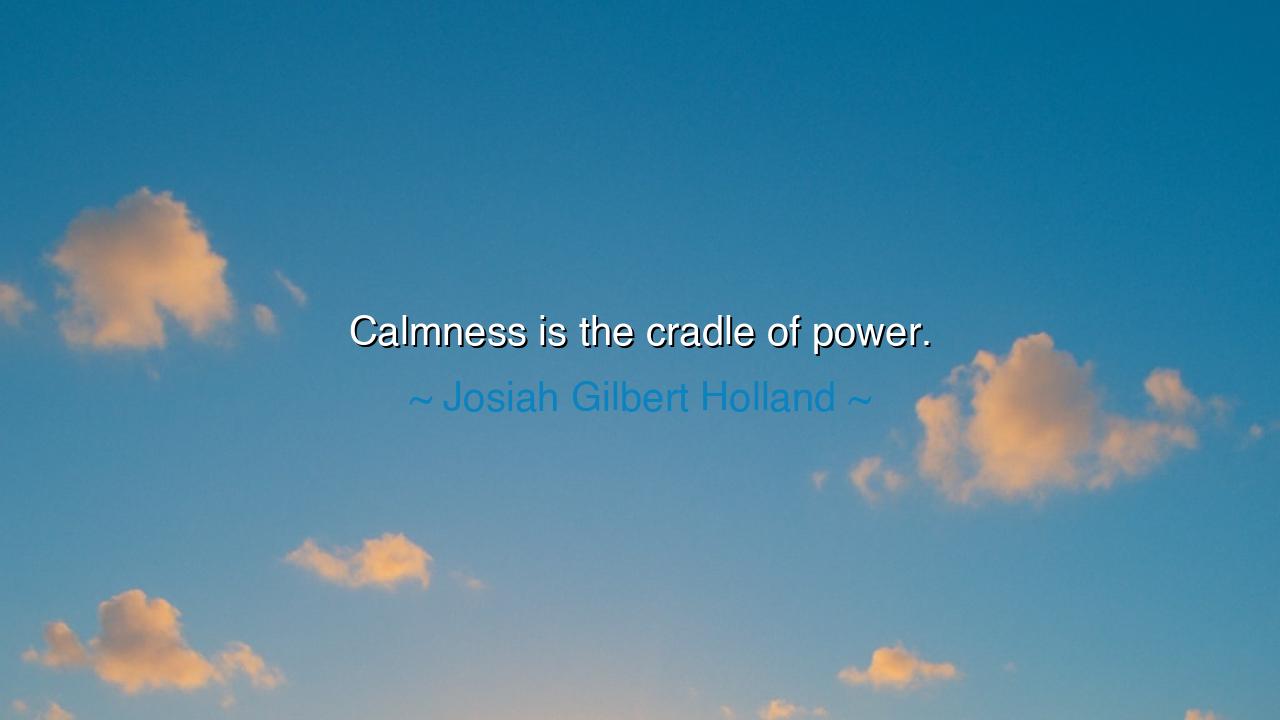
Calmness is the cradle of power.






"Calmness is the cradle of power." These words of Josiah Gilbert Holland strike like the tolling of a great bell, reminding us that true strength is not born from frenzy, nor from the storming of passions, but from still waters. In the stillness of the heart, the mind takes root and gathers force. Just as the infant lies safe within the cradle, nurtured and prepared for the life ahead, so too does power find its origin in the serene spirit that does not flinch nor falter when the winds howl.
To the ancients, calmness was no weakness, but a divine discipline. The Stoics of Greece and Rome taught that mastery over the self was greater than mastery over nations. For he who rules his soul cannot be enslaved by fear, by rage, or by desire. The warrior who charges in fury is easily broken, but the leader whose mind remains steady as the mountain will see far, strike true, and endure. Calmness is not the absence of fire, but the hearth in which fire is controlled.
Consider the figure of Abraham Lincoln, who bore the weight of a fractured nation upon his shoulders. In days when America seemed about to tear itself apart, when voices clamored for vengeance or despair, Lincoln’s calmness became his shield and his weapon. In quiet reflection, he found the strength to choose words that soothed division and decisions that steered the republic toward survival. His gentleness of spirit concealed an iron will, and through his tranquil steadiness, the nation was preserved. This is the living proof that calmness nurtures power.
The phrase is a reminder for all who would walk the path of greatness: let not the rushing of events scatter your thoughts. The sea may rise in storm, yet beneath the surface lies a stillness that anchors the depths. To cultivate that depth within oneself is to hold dominion over circumstance. A man who can still his heart can bend the world without breaking himself.
So remember, children of the future: wrath burns quickly, and fear corrodes the hand that clutches it. But calmness, patient and unwavering, nourishes the roots of strength. Guard it well, and you will discover that the cradle where serenity rests is also the forge where power is born.






TANguyen Truong An
I’ve always found that in high-pressure situations, the people who remain calm often appear to have the most control over what’s happening. But it also raises a question for me: is calmness always the best approach? In some situations, a strong emotional reaction might be necessary to inspire action or assert boundaries. How do we strike a balance between staying calm and expressing the power that comes from passionate, forceful action when needed?
Vvy
It’s easy to equate power with outward energy, force, or intensity, but Holland’s quote reminds me that calmness could be the more sustainable form of power. When we are calm, we seem to have a clearer perspective and are less likely to make rash decisions. But what about those moments when we feel overwhelmed by emotions? Is there a way to train ourselves to stay calm in those chaotic moments, or is it a skill that takes years to develop?
QK11.Gia Quoc Khanh
The idea that calmness is a source of power resonates with me because I’ve noticed that people who remain calm tend to handle situations with greater clarity. But I’m curious—how do you build this kind of calmness? Is it something that can be developed over time, or are some people naturally more calm under pressure? I’m fascinated by the link between emotional control and effective leadership. Could we see this calmness as the foundation of better decision-making?
TGTra Giang
This quote makes me think about how often we associate power with control or domination. But Holland flips that notion, suggesting that calmness is where real power begins. In situations of conflict or stress, how can we cultivate this sense of calm to avoid escalating tensions? Is it possible to be too calm? Can calmness sometimes be mistaken for weakness or indifference, especially in high-stakes situations?
TPThanh Pham
I find this quote really intriguing because it suggests that true strength doesn’t come from loudness or aggression, but from inner peace. In a world where being constantly busy and reactive is celebrated, can we really say that calmness is the true source of power? Does this mean that people who maintain composure in stressful situations are more powerful than those who lash out? It makes me wonder if we are all underestimating the strength that calmness brings.